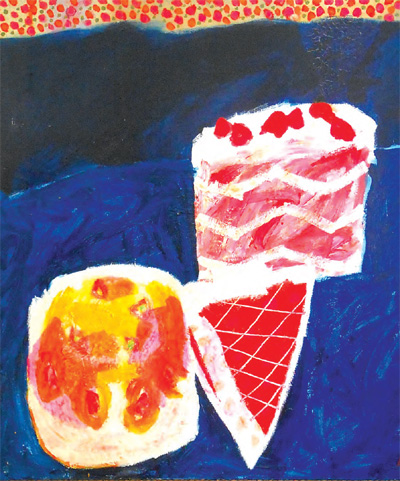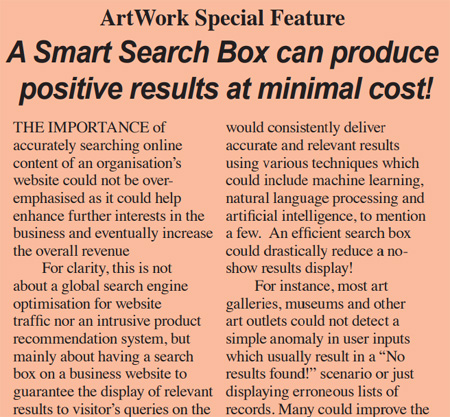
Old None's Almanack*
ArtWork's Jick Nones, consulting his crystal ball, looks into the future and predicts turbulent times ahead for the arts
December 2025. Following disastrous eco¬nomic forecasts for the UK in 2026 the Gov¬ernment, its hand forced by the Treasury, has appointed the independent think-tank, Artless, to advise on future policy.
January 2026. Cabinet ministers, spotted caving in Yorkshire and climbing in Cum¬bria, confirm that they are practising how to get out of a tight spot, between a rock and a hard place.
Following the success of its "Pink Ball" fundraiser, which raised £2.5M, The British Museum announces The Rainbow Project, a series of monthly coloured balls. Tate Britain, equally desperate for funds, reveals that it is to become a boutique hotel, offering a chance to sleep with iconic mas¬terpieces. The National Gallery, in associa¬tion with the Louvre, promotes "Break-in Experiences".
February. The Culture Minister announces the abolition of the Arts Council, and the British Council, due to financial pressures. In Cornwall, a group of the UK's wealthi¬est writers, musicians, artists, actors and film-makers are spotted. A reporter is told they are doppelgangers, look-alikes for a block-buster film. Some Cabinet Ministers are also seen nearby.
March. In a surprise announcement the Government calls a snap election at the end of April. The CEO of Artless, Artemisia Artful, announces that she is to lead a new party, the Arty Party, on a Gross National Creativity ticket, with significant financial backing from wealthy individuals who have made name, fame and fortune from their creativity, and that they will be fielding candidates in every UK constituency.
Over the next six weeks the ArtyParty dominate the media. Artless research con¬firms that creativity has positive impact on national wellbeing, happiness, community health, and economic productivity, with a decrease in crime. Paradoxically, creativity correlates with reduced consumption, less competition, and more co-operation.
April. The Arty Party are elected with an overwhelming majority, and a mandate to implement unprecedented changes in how creativity is embedded in the national way of life.
May. The Royal Academy announce that the Summer Exhibition selection is to be by lottery, with exhibits displayed reduced to one hundred due to budget constraints. Following an outcry Buckingham Palace is offered as a venue for all entrants, with no selection. Tens of thousands of entries are received. The new arrangement is a huge success, attracting vast number of foreign visitors, eager to see inside the Palace.
June. The Government, in association with Covent Garden, Sadlers Wells, ENO, Opera North, Scottish Opera, and Glyndebourne, introduces "Opera for All, Everywhere You Go". Transport workers on trains and buses, trained in bel canto, sing all public announcements, interspersed with operatic arias.
Wimbledon, in recognition of its full title "All England Lawn Tennis and Croquet Club". announces two new tournaments, tennis-ballet, and dance-croquet, in associa¬tion with the Royal Ballet and Sadlers Wells.
July. Opera for All proves so successful that it is extended to hospitals and prisons, with dramatic improvements in recovery time and morale. Tennis-ballet has proved so pop¬ular that the MCC introduces cricket-ballet to complement the Test Series.
August. The BBC declares the Albert Hall roof unsafe. Rather than cancel the Proms, they continue in True Brit-Grit, stiff upper-lip style, umbrellas at the ready, and a canopy over the stage. Advance bookings confirm this was the right decision. Man¬agement instal a swimming pool in the promenade area. Initial tests confirm a transformational impact on sound quality.
September. The FA introduce ballet and opera into premier league games, along with a more complex, multi-layered scoring system.
The Arty Party Secretary of State for Education confirms that curricula in schools and universities are being reviewed to en¬sure Arts and Humanities are given a higher profile.
October. The Health Secretary confirms that GPs, prescribing creative and outdoor pursuits to complement medication and surgery for many conditions, report posi¬tive results across the board. Hospitals and surgeries create Physic Gardens growing medicinal and culinary plants.
November. The Minister for Food Security and Rural Affairs, in a joint announcement with the Royal College of Music, announce that performing live music improves the quality and disease resistance of plants and animals. Farmers and growers are offered subsidies to engage musicians.
December. The Patent Office announce large increases in new inventions, ascribed to increased creativity in the workplace. These are attracting global interest. The UK's intellectual capital has increased ten¬fold in six months. Inward investment into the UK has reached unprecedented levels, enabling the national debt to be written off.





